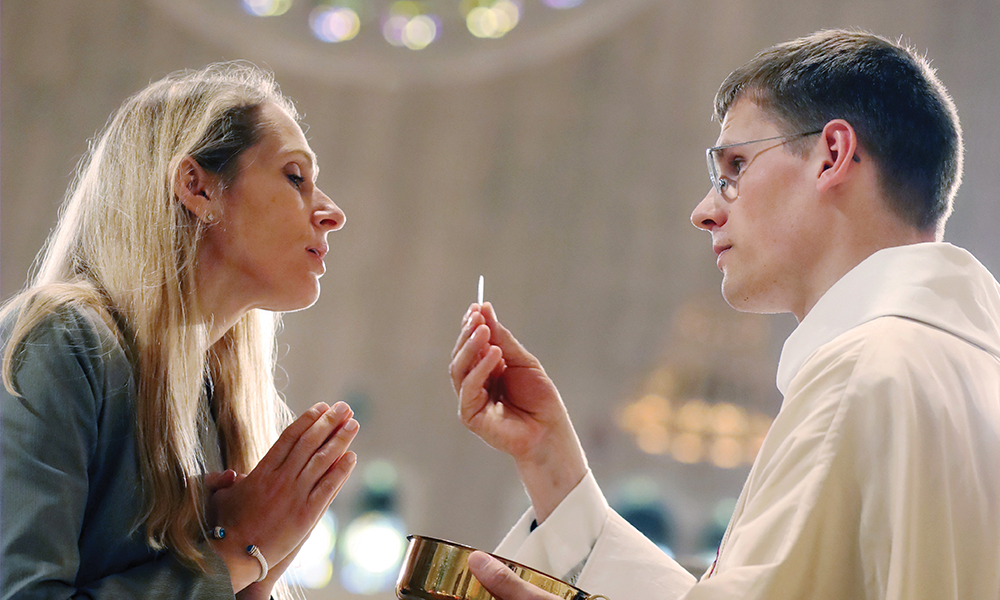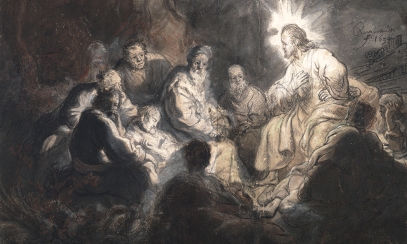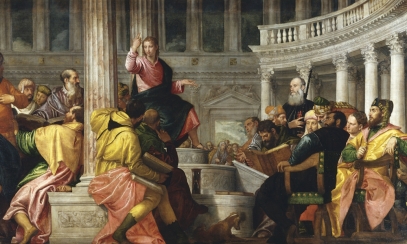
Jesus receives me
What’s going through your mind when you are about to receive Holy Communion? Sometimes we come to Holy Communion like a vending machine, like we are about to receive some “thing.” When we receive some “thing,” we are not that focused on what is happening. We are preoccupied and going through the motions, pushing buttons to get a Snickers bar. We don’t think much about the Snickers bar after getting it into our hands.
What’s going through your mind when you are about to receive Holy Communion? Sometimes we come to Holy Communion like a vending machine, like we are about to receive some “thing.” When we receive some “thing,” we are not that focused on what is happening. We are preoccupied and going through the motions, pushing buttons to get a Snickers bar. We don’t think much about the Snickers bar after getting it into our hands.
In his final encyclical, Ecclesia de Eucharistia (The Church from the Eucharist), Pope St. John Paul II said, “We can say not only that each of us receives Christ, but also that Christ receives each of us” (EE 22).
Pause on that for a moment…
Approaching Holy Communion is not to approach a vending machine, but the Word of God. It is to come to Jesus. We not only receive him, but he receives us. Instead of thinking of it as waiting our turn at the vending machine, we should look at the communion procession as a wedding procession of sorts.
One of my favorite things about celebrating weddings is to look at the faces of the bridegroom and bride, especially as she walks down the aisle. There is always such joy and gratitude in that moment. As the groom stands next to me, I can see his face beaming as she walks down to him step by step with Pachelbel’s Canon in the background. This is an image truer to the mark when we think about the reception of Holy Communion. When we are coming down the aisle to receive Christ the Lord, the Bridegroom of the Church, he is waiting to receive us from the hands of the Father. The Eucharist is a nuptial sacrament.
The more aware we are of this, the more prepared we can be. No one needs to prepare to go to the vending machine; you are in and out. But weddings are different. We make preparations. How do we prepare to receive Holy Communion?
First, we believe. When the priest says, “The Body of Christ” we reply, “Amen.” We are saying we believe what he says. As it was in the days of Jesus, this is not easily understood today either. Can it be that what looks like bread and wine is something altogether different? We believe because of Jesus’ own words, “My flesh is true food and my blood is true drink” (John 6:55).
Second, we come hungry. The Church asks us to abstain from food and drink for one hour before receiving Holy Communion. (Water or medication does not count, and the fast does not apply to the elderly, infirm or those who care for them.) (Code of Canon Law, 919) Why do we fast? It is an expression of our hunger for God. There are hunger pangs in the human spirit able only to be satisfied by the bread of angels.
Third, we prepare by examining our consciences, as recommended by St. Paul (1 Cor. 11:27-29). Anyone conscious of a grave sin is to receive the Sacrament of Reconciliation before coming to Communion (Catechism of the Catholic Church 1385). The Lord wants to bless us with courage in making this sacrament part of our spiritual regimen.
We go to Mass to encounter Jesus in the greatest way possible this side of heaven. The next time you receive Holy Communion don’t think about receiving some “thing,” think about being received by some “one.”
The principal fruit of Holy Communion is “an intimate union with Christ Jesus” (CCC 1391). What did he tell us in the synagogue at Capernaum? “Whoever eats my flesh and drinks my blood remains in me and I in him” (John 6:56). He is waiting for you at the altar with a beaming face.
Father Andy Laframboise is pastor of St. Elizabeth of Hungary Parish in Reese and St. Frances Xavier Cabrini Parish in Vassar and director of priestly vocations. He holds a licentiate in Sacred Theology in Marriage and Family Studies from the Pontifical John Paul II Institute for Studies on Marriage and Family.



